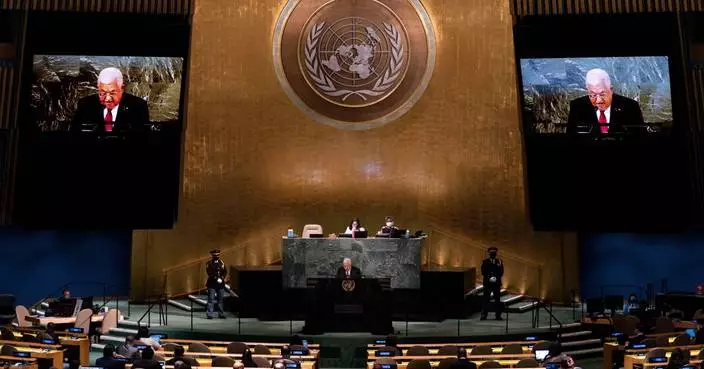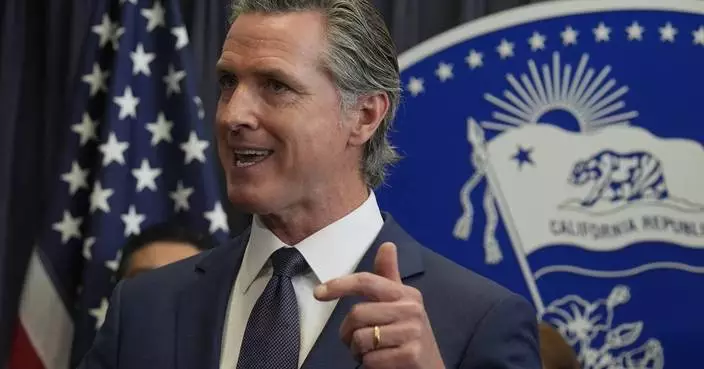In 2016, Iowa State University accused an employee of fraud and theft in a dispute over the unusual but lucrative campus assets she managed: popular outdoor sculptures made of thousands of Lego bricks.
Three years later, the school has withdrawn its allegations against Teresa McLaughlin under a settlement reached last month. The university paid McLaughlin $225,000 in wages and attorneys' fees, will offer her health insurance until 2022 and has given her a glowing letter of recommendation from its president calling her an honest employee who made major contributions over 17 years. Iowa State will also dedicate a bench for McLaughlin in Reiman Gardens, the campus landmark that she spent much of her career building as its director.
Those steps end a dispute that derailed the Lego art program conceived by McLaughlin, called Nature Connects. The traveling exhibits featured sculptures of plants and animals, were displayed at zoos and gardens nationwide and brought in revenue for Iowa State.
McLaughlin said she wants to restore her reputation, which she believes was unfairly sullied by her alma mater. She said the university made claims of wrongdoing against her without evidence and while in possession of records that exonerated her.
She said the dispute hurt her finances and "took a great toll on me and my family."
"I did not think Iowa State would do this to me," she said in an interview in Coralville, where she lives. She called the experience "confusing, unfair and unfortunate."
The university does not admit wrongdoing in the settlement, which avoided a June trial.
McLaughlin envisioned the sculptures as a way to draw visitors to Reiman Gardens, a 17-acre (7-hectare) space on the Ames campus. McLaughlin began working there in 1999 and built one of the "finest and most unique public gardens in the country," according to university President Wendy Wintersteen's recommendation letter.
Iowa State hired Brooklyn artist Sean Kenney to build the sculptures, which went on display at Reiman Gardens in 2012. Seeing demand to market them nationwide, the school reached agreements with Kenney to build four more.
McLaughlin stepped down as gardens director in 2014 to become director of Nature Connects. Dozens of institutions from Hawaii to Chicago agreed to pay between $70,000 and $150,000 to display the exhibits for several weeks. Directors of zoos and gardens raved about how they boosted attendance.
But by 2016, an aide to Roy Reiman, a top university donor who helped fund the exhibits and for whom the gardens are named, was questioning the costs, including payments to Kenney and McLaughlin, who received a 10% commission on exhibit sales under her university contract.
Emails show that a top aide to then-President Steven Leath pushed to change the formula for splitting the profits with the artist so the school could get a larger "administrative fee." McLaughlin objected to the request, noting the contracts had been signed after reviews by Iowa State officials and could not be changed unilaterally.
A school-ordered restructuring then laid off McLaughlin's assistant and transferred oversight of the program's finances to the administration. Kenney began complaining that the university took away support that was critical to making the exhibits successful and wasn't paying him what he was promised. A frustrated McLaughlin announced she would take an early retirement but agreed to stay a few months to finalize several pending sales. Things soon got worse.
She received a surprise letter from a law firm hired by Iowa State. The letter ordered her to stop working and telling her she was under investigation for alleged conflicts of interest related to her outside work with Kenney's company.
Iowa State stopped paying commissions McLaughlin was owed, and she filed a lawsuit seeking payment. The university filed counterclaims accusing McLaughlin of breaching her fiduciary duty and committing fraud and unjust enrichment. It alleged that she was profiting at the university's expense by secretly helping Kenney market competing exhibits.
McLaughlin said the claims were false, noting that Iowa State approved her limited work for Kenney's company. She denied ever putting Kenney's interests ahead of Iowa State's and she earned little from the arrangement. Iowa State settled its dispute with Kenney in 2017. McLaughlin, 62, said she doesn't understand why the school fought her for two more years.
On the bench honoring her, McLaughlin has asked the school to enshrine a Dalai Lama quote: "Be kind whenever possible. It is always possible."
WASHINGTON (AP) — A soon-to-be-released Biden administration review of Israel's use of U.S.-provided weapons in its war in Gaza does not conclude that Israel has violated the terms for their use, according to three people who have been briefed on the matter.
The report is expected to be sharply critical of Israel, even though it doesn't conclude that Israel violated terms of U.S.-Israel weapons agreements, according to one U.S. official.
The administration's findings on its close ally's conduct of the war, a first-of-its-kind assessment that was compelled by President Joe Biden's fellow Democrats in Congress, comes after seven months of airstrikes, ground fighting and aid restrictions that have claimed the lives of nearly 35,000 Palestinians, mostly women and children.
Biden has tried to walk an ever-finer line in his support of Prime Minister Benjamin Netanyahu’s war against Hamas. He has faced growing rancor at home and abroad over the soaring Palestinian death toll and the onset of famine, caused in large part by Israeli restrictions on the movement of food and aid into Gaza. Tensions have been heightened further in recent weeks by Netanyahu’s pledge to expand the Israeli military’s offensive in the crowded southern city of Rafah, despite Biden's adamant opposition.
Biden is in the closing months of a tough reelection campaign against Donald Trump. He faces demands from many Democrats that he cut the flow of offensive weapons to Israel and denunciation from Republicans who accuse him of wavering on support for Israel at its time of need.
Two U.S. officials and a third person briefed on the findings of the national security memorandum to be submitted by Secretary of State Antony Blinken to Congress discussed the findings before the report's release. They spoke on condition of anonymity because the information was not yet public.
A senior Biden administration official said the memorandum is expected to be released later Friday, but declined to comment on its conclusions.
Axios first reported on the memorandum's findings.
The Democratic administration took one of the first steps toward conditioning military aid to Israel in recent days when it paused a shipment of 3,500 bombs out of concern over Israel’s threatened offensive on Rafah, a southern city crowded with more than a million Palestinians, a senior administration official said.
The presidential directive, agreed to in February, obligated the Defense and State departments to conduct “an assessment of any credible reports or allegations that such defense articles and, as appropriate, defense services, have been used in a manner not consistent with international law, including international humanitarian law.”
The agreement also obligated them to tell Congress whether they deemed that Israel has acted to “arbitrarily to deny, restrict, or otherwise impede, directly or indirectly,” delivery of any U.S.-supported humanitarian aid into Gaza for starving civilians there.
Lawmakers and others who advocated for the review said Biden and previous American leaders have followed a double standard when enforcing U.S. laws governing how foreign militaries use U.S. support, an accusation the Biden administration denies. They had urged the administration to make a straightforward legal determination of whether there was credible evidence that specific Israeli airstrikes on schools, crowded neighborhoods, medical workers, aid convoys and other targets, and restrictions on aid shipments into Gaza, violated the laws of war and human rights.
Their opponents argued that a U.S. finding against Israel would weaken it at a time it is battling Hamas and other Iran-backed groups. Any sharply critical findings on Israel are sure to add to pressure on Biden to curb the flow of weapons and money to Israel’s military and further heighten tensions with Netanyahu’s hard-right government over its conduct of the war against Hamas.
Any finding against Israel also could endanger Biden’s support in this year's presidential elections from some voters who keenly support Israel.
At the time the White House agreed to the review, it was working to head off moves from Democratic lawmakers and independent Sen. Bernie Sanders of Vermont to start restricting shipments of weapons to Israel.
Israel launched its offensive after an Oct. 7 assault into Israel, led by Hamas, killed about 1,200 people. Two-thirds of the Palestinians killed since then have been women and children, according to local health officials. U.S. and U.N. officials say Israeli restrictions on food shipments since Oct. 7 have brought on full-fledged famine in northern Gaza.
Human rights groups long have accused Israeli security forces of committing abuses against Palestinians and have accused Israeli leaders of failing to hold those responsible to account. In January, in a case brought by South Africa, the top U.N. court ordered Israel to do all it could to prevent death, destruction and any acts of genocide in Gaza, but the panel stopped short of ordering an end to the military offensive.
Israel says it is following all U.S. and international law, that it investigates allegations of abuse by its security forces and that its campaign in Gaza is proportional to the existential threat it says is posed by Hamas.
Biden in December said “indiscriminate bombing” was costing Israel international backing. After Israeli forces targeted and killed seven aid workers from the World Central Kitchen in April, the Biden administration for the first time signaled it might cut military aid to Israel if it didn’t change its handling of the war and humanitarian aid.
Presidents Ronald Reagan and George H.W. Bush, in the 1980s and early 1990s, were the last presidents to openly hold back weapons or military financing to try to push Israel to change its actions in the region or toward Palestinians.
A report to the Biden administration by an unofficial, self-formed panel including military experts, academics and former State Department officials detailed Israeli strikes on aid convoys, journalists, hospitals, schools and refugee centers and other sites. They argued that the civilian death toll in those strikes — such as an Oct. 31 strike on an apartment building reported to have killed 106 civilians — was disproportionate to the blow against any military target.

Palestinians mourn their relatives killed in the Israeli bombardment of the Gaza Strip, at a hospital in Rafah, Gaza, Friday, May 10, 2024. (AP Photo/Ismael Abu Dayyah)

U.S. President Joe Biden boards Marine One at Moffett Airfield in Mountain View, Calif., Thursday, May 9, 2024. (Jose Carlos Fajardo/Pool Photo via AP)











